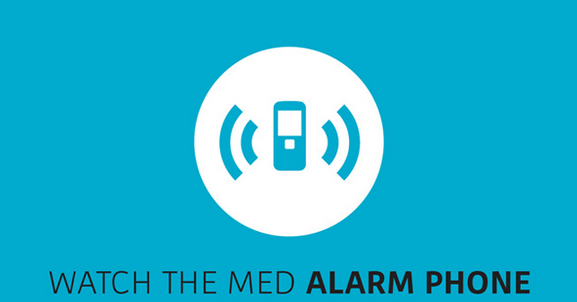

Plaats een aanvulling
Call for Donations for the Watch The Med Alarm Phone
Wanneer: 08/05/2015 - 22:20
An emergency hotline offers support to refugees and migrants in distress at sea for more than six months now. The project documents SOS calls and seeks to immediately build up pressure on responsible authorities to conduct rescue operations, wherever possible.

12th of April 2015: The first emergency call from the Central Mediterranean Sea reaches the Alarm Phone at 7:40am. By the late afternoon the shift teams are in contact via satellite phones with refugees on nine vessels. GPS data is received, updated and forwarded to coastguards. Remaining in contact with the passengers is crucial: our teams frequently pass on information, calm down and encourage them. Most importantly, our teams repeatedly call the coastguards and build up pressure until rescue operations are confirmed. On this day, these practices succeed with regards to all nine vessels. A case on such large scale has not been experienced before by this transnational solidarity project.
The Alarm Phone is available already since October 2014. Since then, about 100 volunteering activists organise their phone shifts through a self-organised call centre. They are based in Europe and North Africa and most of them have been politically engaged for many years along the external borders of the EU. They have trained with handbooks, have practiced with inter-active geographical maps and have devised emergency plans. Throughout the winter period there was, on average, one serious case per week, and distress calls were received from the Western Mediterranean Sea as well as the Aegean Sea. In the past few weeks, the number of calls has surged.
In Morocco, overcoming the border fences to the Spanish enclaves is becoming increasingly difficult, also now that push-backs have been legalised. Here, too, more and more people will get onto boats to reach Spain. Currently, hundreds of refugees seek to reach Greek islands from Turkey on a daily basis. For years, the Greek coastguard is known for illegal ‘push-backs’: refugee vessels are systematically towed back to Turkish waters. The new Syriza government has apparently instructed to cease these human rights violations. The Alarm Phone hotline is all the more important if coastguards do not adhere to these instructions.
The EU border regime has caused more than 1700 casualties in 2015 so far, mostly in the Central Mediterranean Sea, not least since sea rescue operations were systematically reduced due to pressures of Western European governments. Without fundamental changes one can expect that many more will follow. The responsible politicians stick to their brutal policies of deterrence and seek to further externalise migration controls to countries of transit. In opposition, the Alarm Phone demands safe and legal possibilities of entry and requests ‘ferries not Frontex’ in order to end the dying at sea. At the same time, there is an urgent need for everyday support with interventions in real-time if boat-refugees enter situations of distress at sea.
In order to continue with our work, the Alarm Phone project requires further support in order to:
- run the hotline, to reach out to the satellite phones of boat-people and to charge these phones online with credit;
- spread the emergency number via visiting cards in various languages in migrant communities;
- distribute leaflets with information about risks at sea;
- create materials for campaigns against Frontex and the border regime;
- undertake networking and research trips to the different transit regions.
We therefore ask you for donations that are tax deductible.
You can find the Alarm Phone‘s frequently updated reports here:
http://watchthemed.net/
For more information and materials:
http://www.watchthemed.net/index.php/page/index/12
http://alarmphone.org
Contact: wtm-alarm-phone@antira.info
Account for Donations:
Forschungsgesellschaft Flucht & Migration
Sparkasse der Stadt Berlin
Account Number: 61 00 24 264
Bank code: 100 500 00
IBAN: DE68 10050000 0610024264
BIC: BELADEBEXXX
Keyword: WatchTheMed-AP
